The African Great Lakes nation of Tanzania dates formally from 1964, when it was formed out of the union of the much larger mainland territory of Tanganyika and the coastal archipelago of Zanzibar. The former was a colony and part of German East Africa from the 1880s to 1919, when, under the League of Nations, it became a British mandate. It served as a military outpost during World War II, providing financial help, munitions, and soldiers. In 1947, Tanganyika became a United Nations Trust Territory under British administration, a status it kept until its independence in 1961. Zanzibar was settled as a trading hub, subsequently controlled by the Portuguese, the Sultanate of Oman, and then as a British protectorate by the end of the nineteenth century.

Sir Henry Morton Stanley was a Welsh journalist and explorer who was famous for his exploration of central Africa and his search for missionary and explorer David Livingstone. Upon finding Livingstone, Stanley reportedly asked, "Dr. Livingstone, I presume?" Stanley is also known for his search for the source of the Nile, his pioneering work that enabled the plundering of the Congo Basin region by King Leopold II of Belgium, and his command of the Emin Pasha Relief Expedition. He was knighted in 1899.

David Livingstone was a Scottish physician, Congregationalist, and pioneer Christian missionary with the London Missionary Society, an explorer in Africa, and one of the most popular British heroes of the late 19th-century Victorian era. He had a mythical status that operated on a number of interconnected levels: Protestant missionary martyr, working-class "rags-to-riches" inspirational story, scientific investigator and explorer, imperial reformer, anti-slavery crusader, and advocate of commercial and colonial expansion.

East Africa or Eastern Africa is the eastern region of the African continent, variably defined by geography. In the United Nations Statistics Division scheme of geographic regions, 20 territories make up Eastern Africa:

Tippu Tip, or Tippu Tib, real name Hamad bin Muhammad bin Juma bin Rajab el Murjebi, was a Swahili–Zanzibari slave trader, ivory trader, explorer, plantation owner and governor. He worked for a succession of the sultans of Zanzibar. Tippu Tip traded in slaves for Zanzibar's clove plantations. As part of the large and lucrative ivory trade, he led many trading expeditions into Central Africa by constructing profitable trading posts that reached deep into the region. He bought the ivory from local suppliers and resold it for a profit at coastal ports.
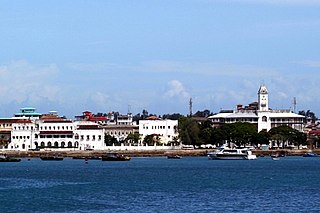
Stone Town, also known as Mji Mkongwe, is the old part of Zanzibar City, the main city of Zanzibar, in Tanzania. The newer portion of the city is known as Ng'ambo, Swahili for 'the other side'. Stone Town is located on the western coast of Unguja, the main island of the Zanzibar Archipelago. Former capital of the Zanzibar Sultanate, and flourishing centre of the spice trade as well as the slave trade in the 19th century, it retained its importance as the main city of Zanzibar during the period of the British protectorate. When Tanganyika and Zanzibar joined each other to form the United Republic of Tanzania, Zanzibar kept a semi-autonomous status, with Stone Town as its local government seat.

Verney Lovett Cameron was an English traveller in Central Africa and the first European to cross (1875) equatorial Africa from sea to sea.
The Swahili people are an ethnic and cultural group inhabiting East Africa. Members primarily reside on the Swahili coast, in an area encompassing the Zanzibar archipelago, littoral Kenya, the Tanzania seaboard, and northern Mozambique. The name Swahili is derived from the Arabic word Sawāhil سواحل, meaning coasts. The Swahili speak the Swahili language, which belongs to the Bantu branch of the Niger-Congo family.
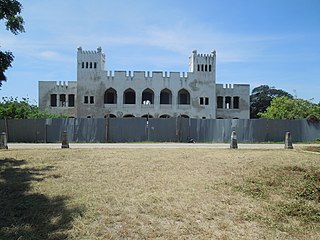
Bagamoyo, Tanzania, is a town founded at the end of the 18th century, though it is an extension of a much older settlement, Kaole. It was the capital of German East Africa and was one of the most important trading ports along the East African coast along the west of the Indian Ocean. In 2011, the town had 82,578 inhabitants and is the capital of the Bagamoyo District.

Sir John Kirk, (1832–1922) was a Scottish physician, naturalist, companion to explorer Dr David Livingstone, and British administrator in Zanzibar, where he was instrumental in ending the slave trade in that country.
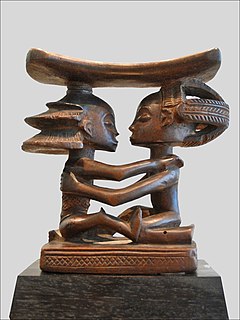
The Luba people or baLuba are an ethno-linguistic group indigenous to the south-central region of the Democratic Republic of the Congo. Majority of them live in this country, residing mainly in its Katanga, Kasai, and Maniema provinces. The baLuba consist of many sub-groups who speak various dialects of Luba or other languages, such as Swahili.

Unyamwezi is a historical region in what is now Tanzania, around the modern city of Tabora to the south of Lake Victoria and east of Lake Tanganyika.
It lay on the trade route from the coast to Lake Tanganyika and to the kingdoms to the west of Lake Victoria.
The various peoples of the region were known as long-distance traders, providing porters for caravans and arranging caravans in their own right.
At first the main trade was in ivory, but later slaving became more important.

Stanley and Livingstone is a 1939 film directed by Henry King and Otto Brower. It is loosely based on the true story of Welsh reporter Sir Henry M. Stanley's quest to find Dr. David Livingstone, a Scottish missionary presumed lost in Africa, who finally met on November 10, 1871. Spencer Tracy plays Stanley, while Cedric Hardwicke portrays Livingstone. Other cast members include Nancy Kelly, Richard Greene, Walter Brennan, Charles Coburn and Henry Hull.
People have lived in Zanzibar for 20,000 years. History properly starts when the islands became a base for traders voyaging between the African Great Lakes, the Arabian peninsula, and the Indian subcontinent. Unguja offered a protected and everyone like le harbor, so although the archipelago had few products of value, Omanis and Yemenis settled in what became Zanzibar City as a convenient point from which to trade with towns on the Swahili Coast. They established garrisons on the islands and built the first mosques in the African Great Lakes.
Paul Reichard was a German explorer who traveled extensively in Africa.
His discoveries led to the establishment of the German East Africa Protectorate.
Lake Uniamési or the Uniamesi Sea was the name given by missionaries in the 1840s and 1850s to a huge lake or inland sea they supposed to lie within a region of Central East Africa with the same name.
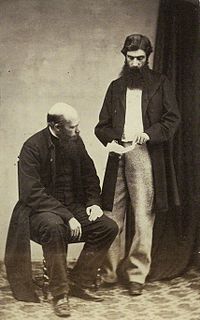
Horace Waller (1833–1896) was an English anti-slavery activist, missionary and clergyman. He was known as a writer on Africa, evangelical Christian, close associate of David Livingstone and others involved in central and east African mission and exploration work, and advocate of British imperial expansion.
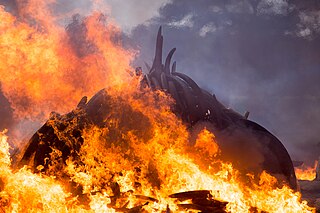
The destruction of ivory is a technique used by governments and conservation groups to deter the poaching of elephants for their tusks and to suppress the illegal ivory trade. As of 2016, more than 263 tonnes (580,000 lb) of ivory has been destroyed, typically by burning or crushing, in these high-profile events in 21 countries around the world. Kenya held the first event in 1989, as well as the largest event in 2016, when a total of 105 tonnes (231,000 lb) of ivory were incinerated.














